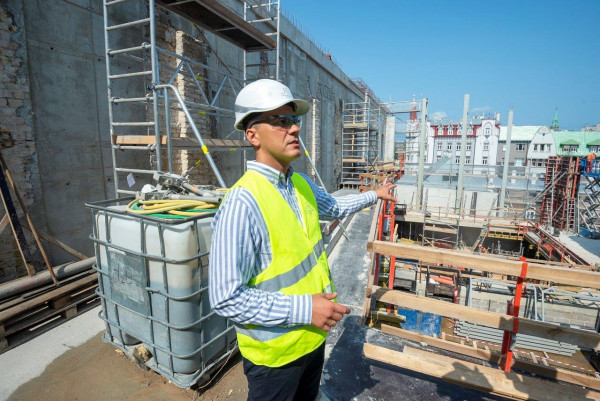








In the heat of this summer, the reconstruction of the historical New Riga Theatre (JRT) building at Lāčplēša iela 25 in Riga, into a modern theatre complex continues under the management of VAS ‘Valsts nekustamie īpašumi’ (VNĪ). Currently, about a third of the main structures of the building have been completed, and one can already see the outline of the space for the audience. The concreting of the Smiļģa Room balcony and the small black-box room has been completed, according to Renārs Griškevičs, board chairman of VNĪ.
The overall work on the building is currently quickly advancing, as the construction of the second floor (including the black-box room) is taking place in the courtyard. The scope of the facilities built for the theatre include the main lobby, two new black-box rooms, three rehearsal rooms, storage rooms and other rooms that JRT needs. The construction of the workshop structures on the first and underground floors will enable a theatre concept, in which everything, from the production of props, to shows themselves, will take place at the same location, without any unnecessary transport, workforce or time costs.
‘This project is technically complex, because the construction is taking place in the historical core of the city, very close to the neighbouring buildings. The construction of the underground portion has been carried out well, and the pile solution preferred really demonstrated its advantages: in choosing it, we went for the method that is safest to the surrounding buildings. There is no dearth of challenges in a project as big as this, but the progress in the construction is palpable, and the historic building is starting to gain its distinctive form. The construction of the theatre’s roof is to take place at the end of the year. 1.5 years of the pandemic have caused a slight a detour in our work schedule. Right now, we closely monitor the way builders work, paying attention to the quality, to occupational safety and the overall progress of the project. In early August, the Lāčplēša Street traffic restrictions will be lifted, as the facade support frame will be removed and the pedestrian tunnel there will no longer obstruct the bicycle lane,’ R. Griškevičs pointed out.
Beside the building of the theatre itself at the construction site, restoration work is also being performed in workshops. Countless layers of oil paint are being removed from various historical wooden elements, like doors, window frames and other interior pieces. Interestingly, the removal of paint sometimes reveals the traces of a fire that damaged the building’s original interiors during the interwar period. There are also plans to partially restore the historical flooring of the theatre.
A contract has been signed with the general partnership SBSC for the construction of the New Riga Theatre for 29.9 million euros. Cooperation with the contractor, the general partnership SBSC, takes place according to the principle ‘Design and build’, which means overall responsibility of the contractor for the construction works and allows challenges to be solved faster.’ The construction is taking place based on a design by the architect Zaiga Gaile, and is slated to end in late 2022.
‘We’re working quickly, doing everything we can to squeeze the unexpected delays back into the planned timeline. We work long shifts, and we work on weekends. We’ve hired more people than originally planned, although the disruptions in the supply of construction materials that affect all of Europe, the consequences of COVID and the extremely hot weather make it extremely difficult to increase the output at the construction site. Temperature on the surfaces of the formwork can often be as high as 60 °C, and the reinforcement rods can heat up to 70 °C in the afternoon. There are limits to working at night, because there are residential buildings all around, with windows open due the heat, so we can’t make too much noise. One thing that helps here is that we’ve been working well together with the entity supervising the building structure part of the design. There is a common understanding that handling the many challenges of this project requires us to cooperate,’ said PS SBSC project manager Jānis Kreicburgs.
Under the conditions of the pandemic, in accordance with the precautionary and safety requirements, work at 43 national construction sites with a total project budget of 156 million euros continues under the management of VNĪ. VNĪ provides professional real estate management and administration for approximately 400 real estate properties with 1100 buildings of 1.02 million square metres and more than 3600 land properties with an area of 9.6 million square metres. The company is one of 23 Latvian companies that have received the highest platinum award as part of the Sustainability Index of the Institute of Corporate Responsibility and Sustainability, confirming the good governance and sustainability of its operations. VNĪ was founded in 1996, 100% owned by the Ministry of Finance of the Republic of Latvia.

